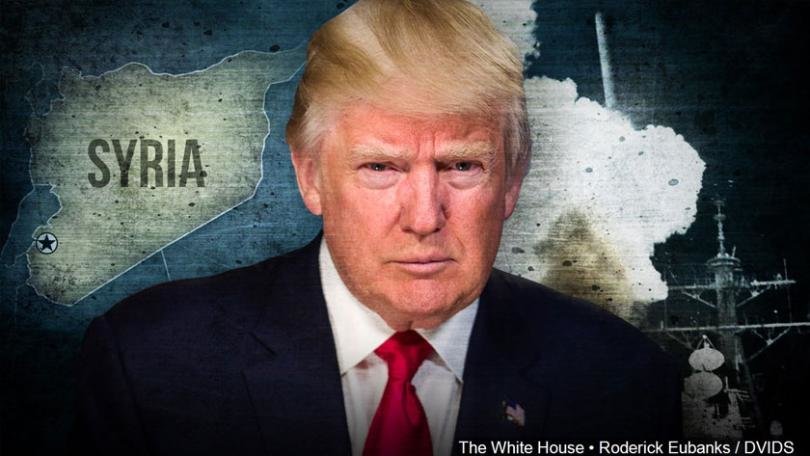The only way of Trump in Syria

TEHRAN - About five years ago, when former U.S. President "Barack Obama" spoke of a military strike in Syria, "Zbigniew Brzezinski", the former U.S. national security adviser and one of the country's main foreign policy strategists, objected to the call of the White House. He noted that the United States lacks a proper strategy towards the Middle East and Syria. Military action should, if it is inevitable, take place within a more developed strategy.
Otherwise, the results will not be positive. But the main question is whether military action solves the problem? And is there basically any strategy to solve this problem? Who is part of this strategy and who is not? These are questions that people should think very seriously about before they take military action, which will have undesirable consequences.
We are now in 2018. Donald Trump is at the head of U.S. political and executive equations. Unlike his promises in 2016, he has begun a costly dispute in the West Asian region. In his speeches, Brzezinski has unveiled the U.S. "lack of appropriate strategy" in Syria. This inappropriate strategy has left both Obama and Trump's governments as defeated states in Syria. Indeed, what exactly has this strategy been? And why has it become the basis and framework for the U.S. measures in the region?
We can come to an understanding of the U.S. strategy in Syria through the words of "Henry Kissinger", former Secretary of State, which was published in New Yorker weekly. In this interview made in January 2011, Kissinger Stressed that Syria should be ignited "from inside", and this is what "is currently happening in this country."
The destruction of Syria in a civil war, is a strategy and goal pursued by US officials over the past six years. The continuing support of Obama and Trump governments from terrorist and Takfiri groups such as ISIL, Jabhat al-Nusra, Ahrar al-Sham and others in Syria can be analyzed in relation to this strategy. The recent limited military intervention performed by Trump has been based on this same strategy. The move was aimed at helping the Takfiri terrorists and "preserving the security crisis in Syria."
The fact is that the destruction of the ISIL caliphate in Syria has made the worst possible impact on the United States and its allies. This important development has had a "strategic" nature. Because it eliminated a significant part of Washington's tools to achieve its strategy in "destroying Syria" and making this country "insecure". Since then, the United States has faced some kind of strategic confusion in Syria.
On the one hand, the American authorities can well see that their tools for realizing their primary strategy in Syria are destroyed, and on the other hand, they don't have the power to plan and define a new strategy in Syria. Many regional analysts believe that Washington is not essentially after adopting a "new strategy" in Syria. Furthermore, the resistance front has been really successful in Syria, and this largely affected U.S. strategic maneuverability in this scene.
The recent U.S. military strike against Syria has been a reflection of the U.S.'s strategic weakness toward the country. This military attack, on the one hand, challenged the missile and military capabilities of the United States before the eyes of the most experienced missile experts in the world. On the other hand, it was identified as an "aimless" attack by analysts of military issues in the world.
The fact is that with this attack, the United States even sparked the anger of its Takfiri mercenaries in Syria. In recent days, many western media have sought to answer one question: "What exactly was Trump's purpose by the recent attack on Syria?" This is while even the president of the United States and his companions in the White House and the Pentagon don't exactly know how to answer this question!
It's obvious that the United States has suffered from a "false strategy" in Syria between the years of 21011 and 2017 (when the ISIL caliphate was destroyed), and from "lack of strategy" since 2017 so far. The White House has lost most of its power in Syria following its failure to realize its initial strategy. On the one hand, Washington is now faced with serious security, military and financial consequences of backing and supporting Takfiri and terrorist groups in Syria, and on the other hand, it's impossible for the U.S. authorities to define a new strategy in the region. We can see the result of this confusion in the behavior of U.S. officials towards Syria and the West Asian region.
The gap between the primary goals of Washington in the region and the existing situation today is indicative of the strategic defeat of the administrations of the 3 U.S. presidents, namely Bush, Obama and Trump in West Asia. Undoubtedly, when the defeat is resulted from tactical mistakes, it may be possible to make up for it. But when it has a strategic nature, it's very difficult and even in some cases impossible to make up for it.
This fact is true of the strategic defeat of the United States in Syria. Under such circumstances, the only way left for the United States is to "confess to defeat" in Syria. Any other choice will have extensive costs for Trump and his government, and even the next Democratic or Republican governments of the United States. Undoubtedly, U.S. allies and mercenaries in the region and the world are also going to be forced to pay these heavy costs as well.
Leave a Comment